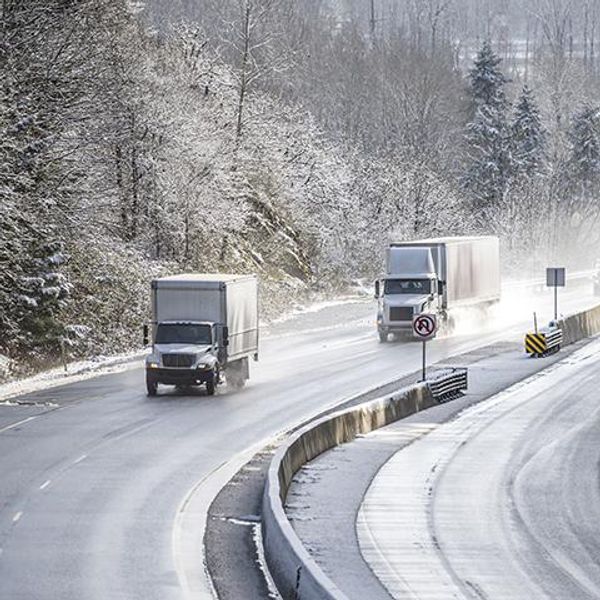9 Tips for Safe Winter Weather Driving

From ice-slicked roads to whiteout conditions, winter weather brings lots of potential hazards. The National Highway Traffic Safety Administration (NHTSA) estimates that 17% of all vehicle crashes occur during winter weather conditions.
Get ready for whatever the winter may bring. Follow these tips to keep yourself and others safe on the road:
1. Drive slower than normal! Slow down to below-posted speed limits in any kind of inclement weather and maintain a safe distance while following other vehicles.
2. Clear your vehicle of ice and snow. Keep your windshield, windows, mirrors, lights and license plate clear so you and other drivers have maximum visibility. Don't let snow or ice create additional blind spots.
3. Watch other drivers. This is the time of year when drivers take shortcuts, such as removing just a tiny patch of ice from their windshield and trying to drive with limited sight lines. Look out for erratic driving behaviors and practice safe defensive driving.
4. Know the trouble spots. While roads may be treated with salt or sand prior to a snow or ice storm, bridges often aren't, and they freeze faster than the rest of the road. Practice extra caution on overpasses, on highway entrance and exit ramps, and over mountains, where driving conditions can change rapidly.
5. Beware of black ice. Don't assume the road is clear because the air temperature is at or above 32 degrees Fahrenheit. A wet road could be an ice-covered road, even if the sun is out. If the road looks wet and you don't see road spray, or if you see ice on your antenna or mirror arms, expect black ice on the roads.
6. Don't forget about wind, rain and fog. They often accompany winter storms. Watch for strong wind gusts, especially when hauling an empty trailer. Use lights and keep your windshield as clear as possible in fog. Watch for hydroplaning during heavy rain. If you hydroplane, take your foot off the gas and steer in the direction you are hydroplaning. Don't use cruise control in heavy rain.
7. Prepare for an emergency. Pack the basics, including extra blankets, food and water. If you get stranded, stay parked and call dispatch or 911 for help.
8. Step carefully. Wear boots with good grip so you can enter, exit and walk around your truck safely. Watch for road hazards as you exit and enter the vehicle.
9. Don't take unnecessary chances. Keep up with weather reports and if conditions worsen — or if you feel unsafe — stop driving and find a safe place to park. Also, plan for extra driving time due to inclement weather.
